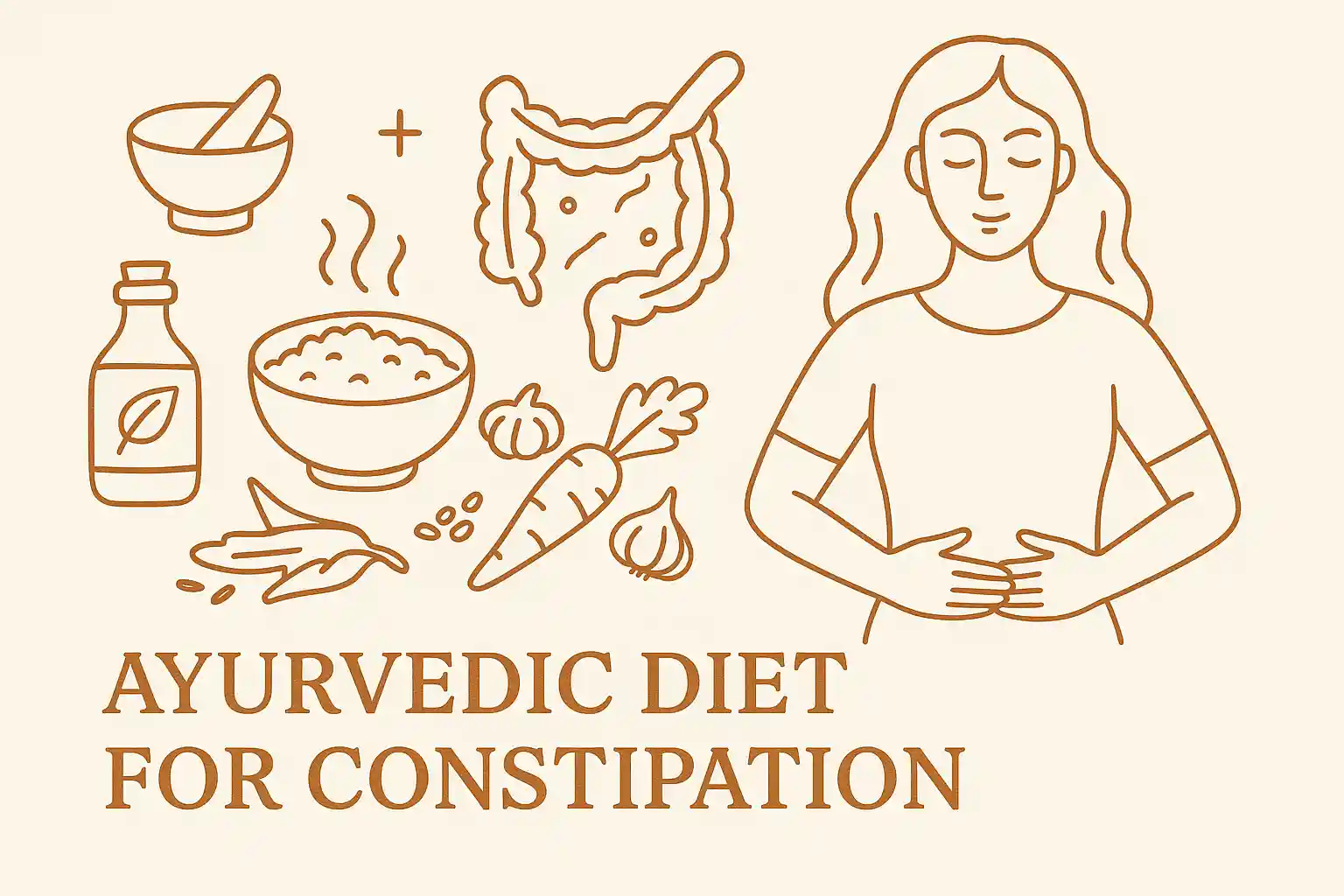
Gentle Ayurvedic remedies for constipation: nourishing foods and herbs that restore natural elimination
Constipation, known in Ayurveda as Vibandha, is more than just irregular bowel movements. It reflects an underlying imbalance in Vata Dosha, particularly the Apana Vata subtype, which governs elimination. Ayurveda views digestion holistically—constipation often points to impaired Agni (digestive fire), dryness in the colon, or accumulation of Ama (toxins).
This guide explores how to use diet and simple Ayurvedic strategies to restore smooth, regular elimination in a sustainable, gentle way. These insights are rooted in classical texts such as Ashtanga Hridayam (Sutrasthana 7.63–65), which describe Vibandha as a Vata-dominant condition requiring warm, oily, and nourishing interventions. Understanding how foods affect your body through Virya (energetic potency) and Vipaka (post-digestive effects) helps you choose the most effective remedies.
Personalized Anti-Constipation Meal Planner
Get a customized meal plan designed specifically for your dosha and constipation severity using traditional Ayurvedic principles.
Ayurvedic Causes of Constipation
From an Ayurvedic perspective, constipation can stem from:
- Excess Vata: Dry, light, mobile qualities disturb the colon's lubricated flow
- Weak Agni: Poor digestion slows peristalsis
- Dehydration or dry diet: Lack of oils and fluids
- Suppression of urges: Delaying natural elimination
- Mental stress: Vata accumulates in the nervous system, disrupting Apana Vata
Constipation can also arise from Kapha imbalance, though less commonly. In Kapha-related cases, stool is heavy, sticky, and sluggish due to excessive mucus and reduced metabolic fire.
General Dietary Guidelines for Constipation
To balance Vata and rehydrate the colon, Ayurveda recommends:
Favor:
- Warm, moist, oily foods: Stews, soups, kitchari
- Cooked fruits: Stewed apples or pears with ghee
- Healthy fats: Ghee, sesame oil, olive oil
- Hydrating grains: Oats, rice, quinoa
- Spices that kindle Agni: Cumin, ginger, fennel
Avoid:
- Dry snacks and crackers
- Raw salads (especially cold)
- Caffeine and stimulants
- Cold drinks and ice
- Processed and packaged foods
Best Foods for Constipation Relief
| Food | Why It Helps |
|---|---|
| Ghee | Lubricates colon, improves Agni |
| Stewed prunes/dates | Natural laxative, rich in fiber |
| Warm milk + ghee | Classic bedtime remedy to moisten and stimulate bowels |
| Kitchari | Easy to digest, resets gut and nourishes tissues |
| Psyllium husk (Isabgol) | Gentle bulk-forming fiber when taken with warm water |
| Soaked flax seeds | Slimy texture softens stool and soothes intestines |
| Triphala | Rejuvenates colon, mildly laxative, supports long-term balance |
Real-World Example: Gentle Relief with Triphala and Oils
One Vata-predominant client struggled with dry, infrequent stools for years. After adding warm ghee to meals, stewed fruit at breakfast, and ½ tsp of Triphala powder in warm water at bedtime, she noticed regular, effortless bowel movements within a week. She also began morning abhyanga with sesame oil to pacify Vata systemically. This gentle approach created lasting balance without harsh laxatives.
Vata-Pacifying Constipation Remedies
- Triphala tea at bedtime: ½ teaspoon powder in warm water
- Abhyanga (oil massage): Daily with warm sesame oil
- Castor oil: In severe cases (under practitioner supervision)
- Ghee enemas (Sneha Basti): For chronic dryness-related constipation (therapeutic setting)
Lifestyle Tips to Support Elimination
- Wake up early (before sunrise) to align with Apana Vata timing
- Establish a bowel routine: same time daily, don't rush
- Practice mindful eating: chew thoroughly, avoid distractions
- Gentle movement: yoga postures like Pawanmuktasana or a morning walk
- Stay hydrated: warm water sipped throughout the day
- Manage stress through meditation or breathing practices
When to Seek Help
If constipation persists despite dietary and lifestyle changes, consult an Ayurvedic practitioner. Chronic constipation can indicate deeper imbalances in Vata or Agni and may require tailored herbal or Panchakarma interventions.
Frequently Asked Questions
Common questions about Ayurvedic constipation relief
Related Articles

Understanding Vata Dosha: The Energy of Movement and Change
Discover the dynamic energy of Vata dosha - the force of movement, creativity, and transformation. Learn to recognize Vata characteristics, identify imbalances, and master the art of grounding this powerful yet delicate constitutional type.
12 min read
Ayurvedic Pregnancy Care: Nurturing Mother and Baby Naturally
Discover time-tested Ayurvedic wisdom for nurturing both mother and baby during pregnancy. Learn month-by-month guidelines, safe herbs, and holistic practices for a balanced, healthy pregnancy journey.
15 min read